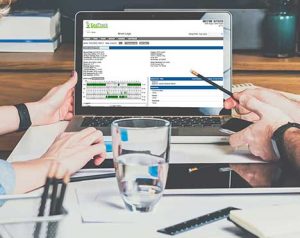
by: Karen Bradley
There are several advantages to fleet tracking, and some of them are pretty obvious. The fact is you can do several things that will increase profitability dramatically:
But how do you do these things? Here are ten quick ways to increase profitability with GPS tracking.

There is nothing more wasteful than a single driver having to double back and cover the same territory over and over again. However, if you ask any driver, they often end up on the same street or in the same neighborhood over and over again, sometimes several times in a single day.
Want to be more profitable and reduce waste? By using data gained from GPS tracking, you can improve driver routing and reduce or even eliminate useless and wasteful double-backs.
![]()
Which driver is closest to the new assignment you just got? Who do you dispatch to cover it? With GPS tracking you can see if a driver has almost completed another assignment closer to a new one and assign it to them rather than a driver who is currently free, but much further away.
That’s just one example. Nearly every fleet manager or dispatcher has had those moments when you send a free driver to a new assignment only to discover a driver already in the area could have covered it faster and more efficiently. Vehicle tracking helps you see these mistakes before they happen and prevent them in the future.

A driver sitting idle isn’t making you any money and might not be making any money themselves. Want to reduce idle time, and keep your drivers and vehicles moving? Vehicle tracking is the answer. Through better routing and dispatch assignments, drivers will be on the move instead of sitting idle, saving you money, and making them more efficient.
In addition, drivers sitting with vehicles idling while doing paperwork or waiting for a new assignment can increase fuel consumption, and many companies can save hundreds of dollars every single month through analyzing and acting on idle and activity reports.
You also don’t want your drivers sitting around bored. Nothing is worse for morale than useless downtime, and when it comes to driver retention, eliminating or reducing it is one key to employee satisfaction.

Those downtime holes in a driver’s day are not only annoying to them and time wasters, but they can also mean that idle hours during the day lead to overtime at the end of it. Want to improve your scheduling and increase the productivity of your drivers? Fleet tracking can be the answer.
The key is not just to gather data, but to analyze and act on it. Looking carefully at where downtime comes from and altering your schedule accordingly can help you not only be more profitable with your current customers but free up time to add more jobs. This is where your partnership with your GPS tracking carrier can make all the difference.

Want to make it easier to send routes to drivers? Want to send updates and new assignments hassle-free? The simplest way is to have a good GPS tracking system that integrates with communication tools for your drivers. They can receive SMS text messages directly through the GPS mapping platform. That means no missed messages or improper routes, employees don’t have to text from their phones, and everyone saves time.
You want your fleet and your employees to be as efficient as possible, and that means making things smoother and easier for them throughout the day. Improving communication between dispatch and drivers is a simple path to a more profitable fleet.

How do you know when something is going wrong with one of your vehicles? Have you seen a drop in fuel efficiency? Is your driver spending time shuttling their vehicle for repairs? There may be a simple solution, and integrating your vehicle tracking with your maintenance schedule can help.
Know when your vehicles are ready for maintenance. Look for problems and spot them when they are small before they turn into something larger. This will help reduce the cost of repairs, driver downtime, and other costly issues.

Speeding, hard braking, sudden lane changes, and other unsafe behavior not only is harder on the vehicles in your fleet, but it can lead to things like accidents or customer complaints. Your drivers are moving around every day with a billboard of your business. What message are they sending?
GPS tracking can give you valuable insights and allow you to take corrective action before something even worse happens. If you need to make driver changes as a result of this data, you can do so before mistakes and bad behavior become even more costly.

That leads to the point that risk reduction is vital to any fleet manager. The smallest issue is minor damage to equipment and vehicles. The worst-case scenario is an accident that results in major damage and potentially catastrophic results.
No matter what your business, it simply isn’t worth the risk. From poor driver behavior to routing around unsafe or undesirable road and weather conditions, fleet tracking gives you a certain amount of control. Reduced risk always means your business is more profitable.

Do you know who likes reduced risk, safer drivers, and well-maintained equipment? Insurance companies. Want to reduce your rates while improving your bottom line? Show your insurance company you are being proactive and tracking your fleet and your drivers. They’ll thank you, often with reduced rates and long term discounts.
Insurance can be a major expense and a major headache for fleet managers. Reduce these costs and achieve higher profitability through vehicle tracking.

How long has your driver been behind the wheel? How many miles have they traveled? Are they in compliance with the Department of Transportation and other regulations? You can find out by simply tracking their driving through digital driver logs.
This tracking not only takes time out of a driver’s day, but it can be a waste of paper and other resources if not done digitally. Improve your profitability and keep you and your driver’s safe and legal through digital driver logs.
Your fleet needs to be profitable first of all. That means keeping your people safe, reducing costs including fuel and insurance, and operating more efficiently through routing and even driver assignments.
Are you tracking your fleet yet? Need help or just want to talk about what your options are? Contact us here at EcoTrack Fleet Management today. We’d love to talk to you!